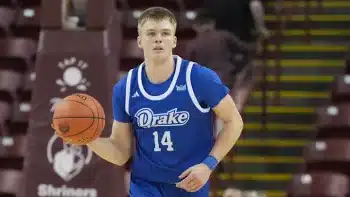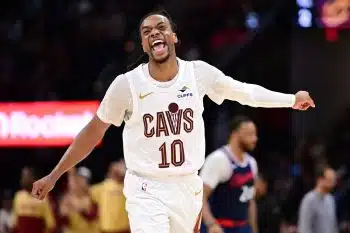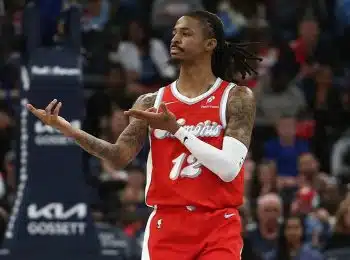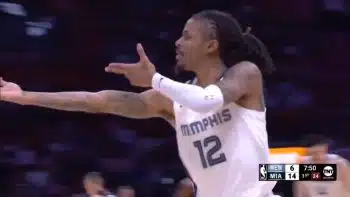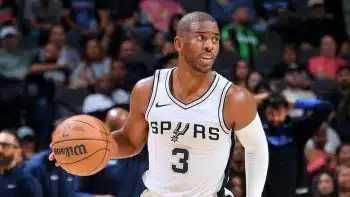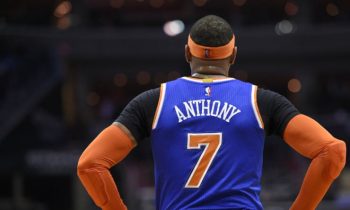NBA
NBA AM: The Damage Caused By Restricted Free Agency
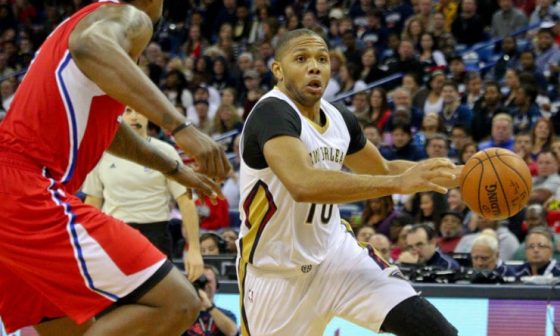
Earlier this week, Basketball Insiders’ senior writer Jesse Blancarte wrote an in-depth piece on the problems of the current restricted free agency system. In this space, we’ll continue the theme of identifying an unfavorable aspect of restricted free agent: The offer sheet.
When it comes to the NBA, the term “offer sheet” refers to a contract offer made by an opposing team to a current restricted free agent. Once the player signs this offer sheet, their current franchise has three days to match the proposed offer or lose the player to the new suitor.
Restricted free agency, in its purest form, has strong benefits for players and team executives.
For the player, it allows them to dip their feet into the free agency pool in an effort to secure a more lucrative payday. Many restricted free agents have gotten larger pay days than expected since teams often make a significant offer so the player’s original team may not match.
For a league executive, restricted free agency allows the market to set the value of the player instead of needlessly bidding against themselves.
But here’s the rub… and where things can get ugly.
Restricted free agents are routinely the last set of guys to get paid when the market opens each summer. This is because teams are reluctant to tie up valuable salary cap space for up to three days while the player’s current franchise decides whether to match the respective offer sheet. In the worst-case scenario, a team will make a large offer, tie up their money for three days, miss out on the player because the other team matched the offer sheet and, in the meantime, miss out on other free agents who signed during that 72-hour period.
So for restricted free agents, unless they are elite-level guys, there’s plenty of waiting involved in the process as the market develops around them. This extended waiting period to get paid naturally leads to a sense of resentment toward their current team for not ponying up the dough quickly.
By the time a restricted free agent is able to get an opposing team to extend an offer sheet, the player is usually ready for a change of scenery due to the perception that their current front office was sitting on its hands and treating them unfairly. Of course, the franchise was just doing its due diligence based on the current rules of the system. But to the player, it is a huge bruise to the ego.
Today, we’ll take a look at what happens after the offer sheet is matched and the player has to return to the team after a turbulent offseason full of tension.
History shows that once it gets to the point where an offer sheet must be matched, the relationship between player and franchise will eventually come to an end. Some of it is the player leaving via free agency at the first opportunity; other times, it’s the franchise waiting for the perfect opportunity to trade the player. But one thing is certain: many player-team relationships have been damaged to some extent due to the nature of the restricted free agency process.
Let’s take a look at some examples of what happened after another team’s offer sheet was matched:
Jeff Teague, Point Guard
July 2013: Atlanta Hawks matched the Milwaukee Bucks’ offer of four years, $32 million
End Result: Hawks traded Teague to Indiana in July 2016
The Hawks traded Teague to the Indiana Pacers this summer, but the writing had been on the wall for quite some time. From the team drafting point guard Dennis Schroder after head coach Mike Budenholzer was hired to the former All-Star being relegated to bench duty late in games, it became clear that it was just a matter of time until Atlanta pulled the trigger on a Teague deal.
It is common knowledge that the restricted free agency process left a sour taste in Teague’s mouth. The point guard struggled to understand why the Hawks organization didn’t shower him with a lucrative offer from day one of the process. But the Hawks, then led by general manager Danny Ferry, wanted to bring Teague back but not at a penny over what the market said he was worth. Once the team matched the deal, it was all smiles – but the tension during the process never subsided and Teague was eventually traded before he was set to hit unrestricted free agency next summer.
Nicolas Batum, Guard / Forward
July 2012: The Portland Trail Blazers matched the Minnesota Timberwolves’ four-year, $46 million offer
End Result: Portland traded Batum to the Charlotte Hornets in July 2015
Batum signed the Timberwolves’ offer sheet in order to join a young core that featured Kevin Love at the time. Batum grew frustrated with Portland’s handling of his free agency and his agent was adamant that the player wanted a change of scenery after signing the offer sheet.
Blazers general manager Neil Olshey has a different take on the saga:
“The decision was made a long time ago,” Olshey said in July 2012, according to ESPN. “We were never not going to have Nicolas back. We did investigate certain things with Minnesota as a due diligence deal. We wanted to make sure we explored every option to improve our basketball team, but there was never a situation where there was a commensurate package offered back that was attractive enough to let Nicolas go.
“He’s always expressed a desire to come back to Portland. His agent did what he needed to do, which is get him the best possible deal for his client. He feels like he did that. Nicolas got his deal, we got our player back and we’ll move on.”
Batum’s restricted free agency saga was filled with tough negotiations and both sides trying to call the other’s bluff at varying time. Ultimately the deal got done, but the relationship didn’t last the duration of the signed deal.
Paul Millsap, Power Forward
July 2009: The Utah Jazz matched the Portland Trail Blazers’ four-year, $32 million offer
End Result: Millsap bolted Utah in free agency once the contract ended to sign with Atlanta in July 2013
The Blazers front-loaded their offer to Millsap in an effort to make it more difficult for Utah to match, but the Jazz ultimately decided to bring Millsap back into the fold anyway. At the time, Utah was close to $5 million over the luxury tax threshold. There were big questions about Millsap’s worth at the time, as he made less than $800,000 the previous season and the team had former All-Star Carlos Boozer on the roster ahead of him on the depth chart. Millsap would eventually become the primary starter for Utah after Boozer departed via free agency in 2010, but left the franchise once he became an unrestricted free agent in 2013.
Eric Gordon, Shooting Guard
July 2012: New Orleans matched the Phoenix Suns’ four-year, $58 million offer
End Result: Gordon signed a four-year deal with Houston this summer once the contract ended
Gordon’s desire not to play in New Orleans has been documented plenty of times, but the two sides at least made the last few seasons amicable. However, once Gordon got a chance to choose his destination, he bolted to Houston.
But if you want to know how players feel about restricted free agency in general, look no further than Gordon’s comments during the summer of 2012 before the Pelicans matched the Suns’ offer sheet.
“Being restricted, you’re just being taken advantage of,” Gordon said, according to NOLA.com. “[The system] is built for players after their rookie contracts to play with their [existing] team. I can’t deny it or have a judgment against that.”
Gordon also flat out said that he hoped to join the Suns, and criticized New Orleans’ roster make up.
“There’s been no negotiations,” Gordon said, according to NOLA.com. “As for now, I don’t know what’s going on. [If the Pelicans match] as of right now, I’d be disappointed.”
“I was a little surprised [New Orleans drafted Austin Rivers]; we have no center and no bigs,” he added. “You look at our roster right now, what do we have, one big? Jason Smith? Before Anthony Davis, we had no bigs. My thing is, if you’re trying to be a good team, and you’ve got a young team, you’ve got to fill in spaces. I am the shooting guard. We’ve got plenty of point guards on our team right now.”
These were some of the most honest and critical quotes to come from a restricted free agent, but New Orleans ultimately decided to match the offer anyway. Still, the bad blood caused by restricted free agency was on full display here (and of course Gordon’s initial trade from the Los Angeles Clippers caused the initial tension).
Roy Hibbert, Center
July 2012: The Indiana Pacers matched the Portland Trail Blazers’ four-year, $58 million offer
End Result: The Pacers traded Hibbert to the Los Angeles Lakers in 2015 for a second-round pick
Portland kicked off free agency with a bang in 2012 by offering Hibbert a max-level deal. The Pacers promptly matched the terms and the team enjoyed strong success the following two seasons. However, the Pacers eventually moved on from the core group and Hibbert was sent packing to Los Angeles.
There weren’t many reports of bad blood in the case of Hibbert, as Indiana seemingly chose to just let the market set their center’s value. But at the end of the day, Hibbert didn’t finish out this contract in Indiana.
Marcin Gortat, Center
July 2012: The Orlando Magic matched the Dallas Mavericks’ five-year $34 million deal
End Result: The Magic dealt Gortat in a three-team deal to Phoenix the following offseason
Before free agency even started, Gortat was publicly stating he wanted to compete for a starting job. But this was 2009 and former All-Star center Dwight Howard was at the top of his game so it wasn’t happening in Orlando.
The Mavericks came offering big money to Gortat, who made less than $800,000 the season before, to compete for their starting spot. Gortat’s camp made it clear they wanted a change of scenery, but the Magic didn’t want to lose such a promising big man prospect for nothing in return.
“It was definitely about the opportunity to find out how good he can really be,” Gortat’s agent Guy Zucker said, according to ESPN at the time. “We had requested that Orlando not match the offer. We stated the fact that he sincerely wanted the chance to carve his own path, be his own man, so to speak, which is not going to be realistically possible in Orlando.”
The Magic matched the deal and subsequently traded Gortat out of town a year later.
DeAndre Jordan, Center
December 2011: The Los Angeles Clippers matched the Golden State Warriors’ four-year, $43 million offer
End Result: Jordan played out this contract and remains in Los Angeles, but gave a verbal commitment to Dallas in 2015 when he became an unrestricted free agent. Jordan then abruptly changed his mind and headed back to the Clippers.
Then-Clippers-GM Neil Olshey was blunt when talking about the team’s approach of taking their time dealing with Jordan’s free agency. It was all about retaining salary cap flexibility.
“There are strategic reasons, there are some sequential transactions that have to happen first,” Olshey said, according to ESPN when asked whether the team would match Jordan’s offer sheet. “We’ve still got $3.5 million in cap room and before we give up that flexibility we have to exhaust every opportunity that we have to use the remaining cap room we have.
“But I would expect DeAndre to be here smiling and being goofy and doing skits with Blake [Griffin] at some point at media day.”
Jordan played out the contract, but flirted with the idea of bolting to Dallas; he gave the Mavs a verbal commitment after reports of internal Clippers issues. The veteran center represents the only player on this list that signed another deal with the same team after the matched offer sheet.
Other players who were matched in restricted free agency but didn’t re-sign with the same team after the contract ended are Josh Smith (offered a five-year deal worth $58 million by Memphis) and J.J. Redick (offered a three-year deal worth $19 million by Chicago).
Players in a similar position to watch in the coming years
Gordon Hayward: Utah matched Charlotte’s four-year, $63 million offer in 2014.
Enes Kanter: Oklahoma City matched Portland’s four-year, $70 million offer in 2015.
Allan Crabbe: Portland matched Brooklyn’s four-year, $75 million offer in 2016.
Tyler Johnson: Miami matched Brooklyn’s four-year, $50 million offer in 2016.
